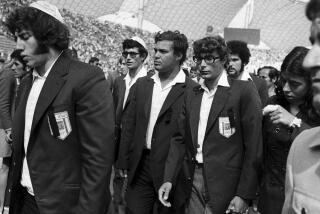U.N. Takes Initial Steps Toward New Iraq Policy
- Share via
UNITED NATIONS — After weeks of stalemate and debate, the Security Council on Saturday took an important first step in the direction of a new policy toward Iraq.
The council established three panels to study disarmament, humanitarian aid and Iraq’s compliance with resolutions regarding prisoners and property taken after its 1990 invasion of Kuwait.
The agreement was the first Iraq-related action by the 15-member council since U.S. and British attacks in mid-December and was designed to gather data for a comprehensive approach toward President Saddam Hussein’s government in Baghdad.
“It puts the Security Council back in the picture,” said Brazil’s ambassador, Celso L.N. Amorim, the council’s president for January, who will head the three panels.
“This is a sign that the council is back in business on Iraq,” said Jeremy Greenstock, Britain’s U.N. ambassador.
U.S. envoy Nancy Soderberg labeled it a “strong first step.”
In essence, council members decided for the moment to concentrate on procedure rather than deep political and policy differences over how to deal with Baghdad.
Russia’s ambassador, Sergei V. Lavrov, underlined that emphasis on procedure over policy. He stressed that while the agreement allowed for members of UNSCOM--the U.N. Special Commission that is charged with ridding Iraq of all weapons of mass destruction--to participate in the disarmament panel, it did not soften his nation’s deep opposition to Richard Butler, UNSCOM’s chairman.
“The current text [of the agreement] doesn’t change our position. We don’t have any official relations with Richard Butler, and we believe he should go,” Lavrov told reporters outside the council’s chamber.
So bitter is Russia’s opposition to Butler, an outspoken Australian diplomat, that when UNSCOM presented an assessment last week to council members of remaining arms control issues in Iraq, Russia blocked the more than 200-page report from becoming an official Security Council document.
Various nations have proposed changes in the commission. Russia wants it abolished, while the United States would like it preserved for the time being as the group mandated to disarm Iraq of its chemical and biological arms and nuclear weapons components.
Since the December attacks, Hussein has refused to allow U.N. arms inspectors to return to Iraq.
Diplomats acknowledged Saturday that a key issue will be how Iraq reacts to the Security Council’s new plan. A major uncertainty is whether panel members--particularly those examining disarmament and the status of Kuwaiti prisoners and property--will be allowed to enter Iraq to obtain information.
The document creating the three panels emphasized the importance of Baghdad’s cooperation with all relevant Security Council resolutions.
The groups will report back to the Security Council by April 15. Amorim will “maintain close liaison” with U.N. Secretary-General Kofi Annan and the council’s president, according to the agreement. The presidency rotates monthly.
The council’s biggest challenge was reaching agreement on the group to study disarmament. A compromise allowed members of UNSCOM to serve as experts along with the International Atomic Energy Agency and those with “any other relevant expertise.”
“The panel would assess all the existing and relevant information available, including data from ongoing monitoring and verification, relating to the state of disarmament in Iraq,” the council said.
The panel will then recommend to council members how to reestablish an effective disarmament, monitoring and verification regime.
Before the attacks in December, the council was considering conducting a comprehensive review of Iraq’s record in destroying its weapons of mass destruction, with the possibility of lifting sanctions.
A report by Butler that Baghdad had initiated new forms of restrictions on the U.N. weapons inspectors scotched the review and served as the rationale by Britain and the United States for the air assaults.
The plan adopted by the council Saturday contained many elements of the comprehensive review but without any discussion of removing sanctions.
While the Security Council was emphasizing diplomacy, U.S. planes patrolling the “no-fly” zones in northern Iraq attacked air defense sites in six separate incidents.
U.S. officials said the planes, which were targeted by Iraqi radar, returned safely to their base in Turkey. An assessment of the damage inflicted was underway.
More to Read
Sign up for Essential California
The most important California stories and recommendations in your inbox every morning.
You may occasionally receive promotional content from the Los Angeles Times.










